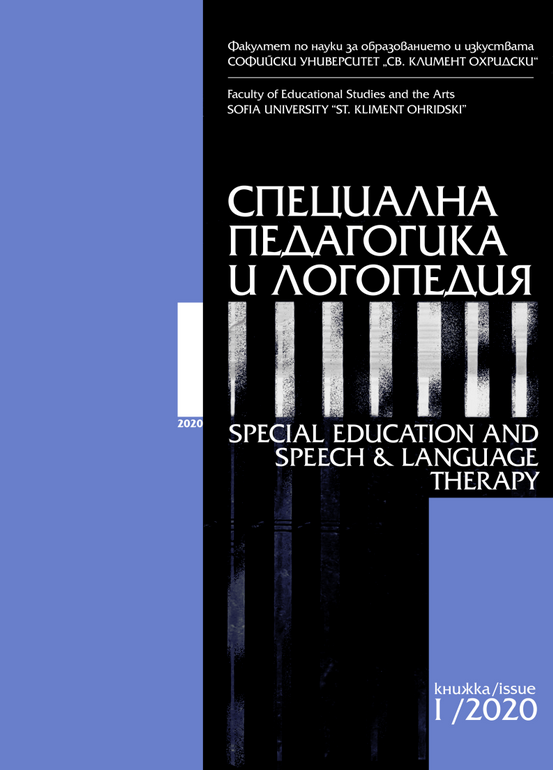Impact of social isolation on everyday life of visually impaired people
DOI:
https://doi.org/10.60059/SPL.2020.1.5-26Keywords:
social isolation, visually impaired, access, daily activities, prevention, COVID-19Abstract
Social isolation is challenging for everyone unless it is undertaken as a personal choice. When facing a situation that demands fast adaptation to an unnatural rhythm and daily routine, people start looking for coping strategies. Remote working, studying, communicating and shopping, which have so far been an incidental option, are now the one and only option. The current article reviews measures undertaken by the majority of organizations of and in support of blind people so as to offer up-to-date information to their members/target audience, to provide for their needs for access, to acquaint them with the available alternative forms of studying, communication, social activities and technologies as well as to reduce to the minimum the feeling of isolation. What is the impact of social distancing and isolation on people with visual impairments, do they encounter difficulties in performing everyday activities and how do they cope with the imposed restrictions and measures for the prevention of the spread of the decease? To answer these questions a survey was conducted among 26 individuals with visual impairments which sought to find out their attitude to the restrictive measures, the degree in which they found it possible to perform their daily activities as well as an analysis of the positive and negative impact on their personal lives.
References:
Radulov, Vl. (2019). Sotsialni problemi na slepotata i slaboto zrenie. Sofia: IK „Fenomen“.
Sotiriou, K. (2018). Avtoreferat na disertatsionen trud na tema: “Razvitie na sotsialni kompetentsii u zritelno zatrudneni uchenitsi”. Sofia: SU „Sv. Kl. Ohridski“.
Tsvetkova-Arsova, M. (2008). Orientirane i mobilnost, vtoro razshireno i dopalneno izdanie. Sofia: UI „Sv. Kl. Ohridski“.
Beecham, J. (2020). The NFB of Colorado Takes the Distancing Out of Social Distancing. Braille monitor, May, Vol. 63, No. 5. Baltimore, Maryland: The National Federation of the Blind.
Crossland, M. (2020). What coronavirus crisis means for blind and partially sighted people. The conversation. UK: Academic rigour, journalistic flair. Retrieved June 2020, from https://theconversation.com/what-coronavirus-crisis-means-for-blind-and-partially-sighted-people-136991.
Danielsen, C. (2020). Federationism in the Time of the Coronavirus. Braille monitor, May, Vol. 63, No. 5. Baltimore, Maryland: The National Federation of the Blind.
Huffman, L. (2020). Access World is Here for You During the COVID-19 Health Crisis. Access World, May. New York: AFB Press.
Kendrick, D. (2020). COVID-19: Confessions from a Blind Germaphobe. Access World, May. New York: AFB Press.
Lowenfeld, B. (1948). Effects of Blindness on the Cognitive Functions of Children. – In: Berthold Lowenfeld on Blindness and Blind People. Selected Papers by Berthold Lowenfeld (1948). New York: AFB, 1981, 67–78.
Pauls, J. (2020). Combat the Tedium of COVID-19 Quarantine with Accessible Games. Access World, May. New York: AFB Press.
Rosenblum, L. (2020). Unprecedented Times Call for Unprecedented Collaboration: How Two COVID-19 Surveys Were Created with Input from Across the Field of Visual Impairment to Analyze the Needs of Adults, Students, Teachers, and Orientation and Mobility Practitioners. JVIB, may, v. 114 (3). New York: AFB Press.
Walker, C. (2020). Learning in the Time of Covid-19: The Impact on Blind Students of Current Guidance Issued by the US Department of Education Regarding Students with Disabilities. Future reflections, Volume 39, Number 1, Winter. Baltimore, MD: American Action Fund for Blind Children and Adults.
COVID-19: stories told over the phone to the visually impaired in Belgium. Retrieved June 2020, from https://unric.org/en/covid-19-stories-told-over-the-phone-to-the-visually-impaired-in-belgium/.
How People Who Are Blind or Have Low Vision Can Safely Practice Social Distancing During COVID-19. Retrieved June 2020, from https://www.lighthouseguild.org/newsroom/how-people-who-are-blind-or-have-low-vision-can-safely-practice-social-distancing-during-covid-19/.
Tips to Help People with Vision Loss Safely Practice Social Distancing During COVID-19. Retrieved June 2020, from https://www.lighthouseguild.org/vision-health/tips-to-help-people-with-vision-loss-safely-practice-social-distancing-during-covid-19/.


